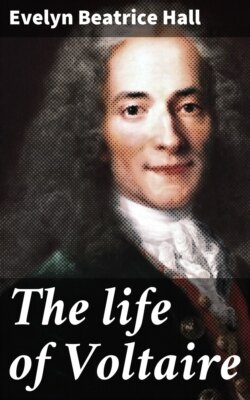Читать книгу The life of Voltaire - Evelyn Beatrice Hall - Страница 11
На сайте Литреса книга снята с продажи.
ОглавлениеHe saw Mrs. Oldfield, the actress, buried with the honours due to her far different and very inferior talent. Perhaps the honours were greater than her desert. But Voltaire, with his passion for the stage, was not the man to think of that.
Thirty-five years later he recalled how he had heard when in England that the daughter of the poet Milton was in London—old, ill, and poor. “In a quarter of an hour she was rich.”
“What would you have done if you had been born in Spain?” said his secretary to Voltaire long after. “I would have gone to mass every day: kissed the monks’ robes: and set fire to their convents. I was not made to live in Spain, nor in France.” “Where then?” “In England.”
But if Voltaire loved the tolerant English religion and the liberal English government and the generous English people, he loved far more “the noble liberty of thinking.” His Letters on Bacon and on Locke, on Descartes and Newton, on the History of Attraction and on Newton’s Optics, are a worship of that free thought that dared to doubt, that searched and tried the old truths which men believed because they were old and for no better reason, and which found them too often to be no truths, but a prejudice, a delusion, and a lie. Voltaire passionately declared that it was the theologians, and not the Lockes, the Bayles, the Hobbes, the Spinozas, who sowed “discord in a state.” He spoke of Locke as “the wisest of human beings”; of Bacon as “the father of experimental philosophy.” “A catechism reveals God to children,” he said; “but Newton has revealed Him to sages.” “Before Locke, the great philosophers had positively decided what the soul of man is, but as they did not know in the least, it is only natural they should all have been of different opinions. … Locke dares sometimes to speak positively but he also dares to doubt.” “How I love English daring!” he cried à propos of Swift’s “Tale of a Tub.” “How I love people who say what they think! We only half live if we dare only half think.”
Voltaire was fully alive at all events. However widely one may differ from his opinions they are at least entitled to respect. They were passionately genuine, the vivid convictions of his soul. He was no dilettante, fine-gentleman unbeliever—too bored and idle to find in the world “the footmarks of a God.” He was from this time henceforth and always one of the most zealous seekers after truth who ever lived. It was to be no more “a fountain sealed”; no more a luxury for a few, but the common property of all. To free Frenchmen by bringing to them the light and knowledge of England—to destroy, so far as in him lay, everywhere and for all men, darkness, ignorance and superstition—that was the Voltairian mission. “He swore to devote his life to that end, and kept his word.”
